I'm trying to floodfill a thresholded image. I created a simple floodfill function. The function, finds the white spots from first image and then flodfills their location in another blank image. It's a recursive function so once it finds a white spot, it do not exit it until sign all the spots. Function firstly checks the right of the pixel, then down side, then left and finally up side.
Problem is when I include the "up" section to the floodfill function, it throws an exception at imshow function. But when I deleted it, there is no exception at all. I have no idea why it causes this.
Exception:
Unhandled exception at 0x00007FF82DCCA2AF (opencv_world343d.dll) in DIP.exe: 0xC00000FD: Stack overflow (parameters: 0x0000000000000001, 0x0000002040E73FE0).
Floodfill function:
void floodFill(cv::Mat src_8uc1,cv::Mat& index_8uc1,cv::Mat& done_8uc1,int y,int x,int index) {//recursive floodfill function
cv::imshow("INDEX IN FLOODFILL", index_8uc1); //IT THROWS THE EXCEPTION RIGHT HERE!!!
cv::waitKey(8);
index_8uc1.at<unsigned char>(y, x) = index;
//right
if ((y < src_8uc1.rows) && (x+1 < src_8uc1.cols)) {
if (src_8uc1.at<unsigned char>(y, x + 1) == 255) {
if (index_8uc1.at<unsigned char>(y, x + 1) == 0) {
x += 1;
floodFill(src_8uc1, index_8uc1, done_8uc1, y, x, index);
}
}
}
//down
if ((y+1 < src_8uc1.rows) && (x < src_8uc1.cols)) {
if (src_8uc1.at<unsigned char>(y + 1, x) == 255) {
if (index_8uc1.at<unsigned char>(y + 1, x) == 0) {
y += 1;
floodFill(src_8uc1, index_8uc1, done_8uc1, y, x, index);
}
}
}
//left
if ((y < src_8uc1.rows) && (x - 1 < src_8uc1.cols)) {
if (x > 0) {
if (src_8uc1.at<unsigned char>(y, x - 1) == 255) {
if (index_8uc1.at<unsigned char>(y, x - 1) == 0) {
x -= 1;
floodFill(src_8uc1, index_8uc1, done_8uc1, y, x, index);
}
}
}
}
//up
if ((y - 1 < src_8uc1.rows) && (x < src_8uc1.cols)) {
if (y > 0) {
if (src_8uc1.at<unsigned char>(y - 1, x) == 255) {
if (index_8uc1.at<unsigned char>(y - 1, x) == 0) {
y -= 1;
floodFill(src_8uc1, index_8uc1, done_8uc1, y, x, index);
}
}
}
}
}
And where I defined the images:
int main( int argc, char** argv )
{
// Read image
cv::Mat src = cv::imread("images2/train.png", cv::IMREAD_GRAYSCALE);
cv::Mat dst2;
// Thresholding with threshold value set 127
threshold(src, dst2, 127, 255, cv::THRESH_BINARY);
if (dst2.empty()) {
printf("Unable to read input file (%s, %d).", __FILE__, __LINE__);
}
cv::Mat src_8uc1 = src.clone(); //FIRST IMAGE
cv::Mat index_8uc1 = src.clone();
index_8uc1 = cv::Mat::zeros(src.rows, src.cols, CV_8UC1); //indexed image (0)
cv::Mat done_8uc1 =src.clone(); //result
int index = 40;
for (int y = 0; y <= src_8uc1.size().height; y++)
for (int x = 0; x <= src_8uc1.size().width; x++)
{
if ((y < src_8uc1.rows) && (x < src_8uc1.cols)) {
if (dst2.at<uchar>(y, x) == 255) {
if (index_8uc1.at<unsigned char>(y, x) == 0) {
//done_8uc1.at<uchar>((x, y))= 255;
floodFill(dst2, index_8uc1, done_8uc1, y, x, index);
index += 1;
}
}
}
}
cv::waitKey(0); // wait until keypressed
}
--------------------------------UPDATE!!!-----------------------------
It's not a exact solution but I had to bypass the error by increasing the "Stack reserve size" in the debugger settings. See here
